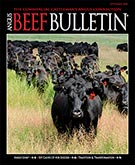AgrAbility Raises Awareness of Medicines’ Side Effects
Pharm to Farm fills health care gaps for farmers.
All medicine has side effects. Even minor side effects can be deadly for farmers, says Kelly Cochran of the Missouri AgrAbility Project’s Pharm to Farm program.
The statewide outreach program helps farmers identify medical risks through their local pharmacist. In many rural Missouri areas, pharmacists fill health care gaps. They are the first line of defense in farm health and safety.
Medicines’ side effects put farmers working with equipment and livestock at risk. The Occupational Safety and Health Administration (OSHA) and the National Safety Council list farming as one of the riskiest occupations for injury and death.
“Taking medicine increases risk of injury by two- to fourfold,” Cochran says.
That risk goes up as farms get larger and the average age of farmers nears 60, says Karen Funkenbusch, University of Missouri (MU) Extension health and safety specialist and Missouri AgrAbility director.
Ninety-eight of Missouri’s 101 rural counties are considered Health Professional Shortage Areas for primary care by the U.S. Department of Health and Human Services.
At least four counties in northern Missouri have no pharmacies, Cochran says. Many of the state’s residents are 10 miles or more away from the nearest drugstore. Many rural residents live even farther from primary care doctors and specialists.
Chronic obstructive pulmonary disease (COPD) and diabetes are more prevalent in rural communities, Cochran says. Chronic conditions such as incontinence, sleep deprivation, bowel problems, pain and heart disease increase the rate of farm accidents.
Medicines often cause dizziness, confusion, drowsiness, blurred vision, lightheadedness and gait problems. Many farmers, because of their stoic nature, do not share concerns with family members and friends, Funkenbusch says.
Cochran and pharmacy students from MU at Kansas City help farmers identify medicines that may be of risk to them. They talk about ways to improve safety on the farm. They work with community pharmacists because rural people often rely on their local pharmacist for trusted advice.
Pharm to Farm students help pharmacists, often raised and educated in non-rural areas, learn about farm life and farm values — independence, pride, thrift, skepticism and strong work ethic. They also talk about safety barriers in rural settings, such as long work hours and seasonal deadlines.
Other barriers for farmers and ranchers include limited access to health care, resources and health insurance. Pharm to Farm students encourage pharmacists to use less medical jargon when talking to rural clients.
Pharm to Farm provides on-site farmstead assessments to find and lower risks. During on-site visits, they check medicines and talk about their risks.
For more information, con
tact Cochran at cochranke@umkc.edu or Funkenbusch at funkenbuschk@missouri.edu.

Editor’s Note: Linda Geist is a writer for University of Missouri Extension.






